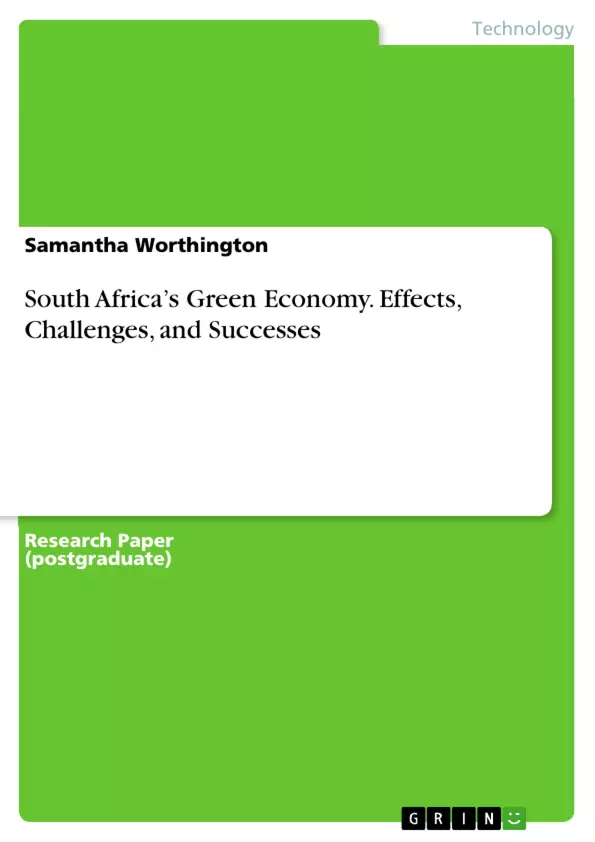According to the Department of Environmental Affairs of the Republic of South Africa (2011), climate change is a shift in the earth’s weather conditions whereby the most noticeable change is increased global temperature which directly affects the global ecosystem, known as global warming. This affects and therefore alters rainfall patterns resulting in severe weather episodes such as flooding and droughts. In this research document climate change will be explored and analysed. The impact of climate change on health, weather, food security and water resources in South Africa will be discussed, and predictions regarding the future of climate change impact within South Africa will be assessed.
Table of Contents
- Abbreviations and acronyms
- The impact of climate change in South Africa
- Initiatives undertaken by the South African government to address climate change
- The impact of climate change on business leaders in South Africa
- The need, role and requirements of the environmental manager
- The benefits of United Nations Global Compact membership
- References
Objectives and Key Themes
This text aims to explore the effects, challenges, and successes related to South Africa's green economy, focusing specifically on the impact of climate change and the nation's response. It examines government initiatives, the role of businesses, and the overall environmental management landscape.
- The impact of climate change on South Africa's environment and population.
- Governmental strategies and initiatives to mitigate climate change.
- The role of businesses in addressing climate change and environmental sustainability.
- The importance of environmental management in South Africa.
- The benefits of international collaborations (like UNGC) for environmental sustainability.
Chapter Summaries
The impact of climate change in South Africa: This chapter analyzes the effects of climate change in South Africa, exploring its impact on various sectors such as health, weather patterns, food security, and water resources. It details the rise in global temperatures, changes in rainfall patterns (including increased flooding and droughts), and the contribution of greenhouse gases to this phenomenon. The chapter cites data demonstrating increased air temperatures in South Africa since the 1950s, linking these changes to human activity, particularly the burning of fossil fuels and deforestation. The chapter also highlights the disproportionate impact of climate change on Africa despite its relatively low contribution to greenhouse gas emissions, referencing specific examples of decreased food production and water scarcity in regions like Kenya. The chapter emphasizes the interconnectedness of climate change and human health, with an increase in heat-related illnesses serving as a prime example.
Initiatives undertaken by the South African government to address climate change: This chapter (summary not available due to missing text in provided document).
The impact of climate change on business leaders in South Africa: This chapter (summary not available due to missing text in provided document).
The need, role and requirements of the environmental manager: This chapter (summary not available due to missing text in provided document).
The benefits of United Nations Global Compact membership: This chapter (summary not available due to missing text in provided document).
Keywords
Climate change, South Africa, green economy, environmental management, greenhouse gas emissions, sustainable development, UN Global Compact, business sustainability, government initiatives, environmental impact.
Frequently Asked Questions: A Comprehensive Language Preview on South Africa's Green Economy
What is the main focus of this text?
This text explores the effects, challenges, and successes related to South Africa's green economy. It specifically focuses on the impact of climate change and the nation's response, examining government initiatives, the role of businesses, and the overall environmental management landscape.
What topics are covered in the Table of Contents?
The Table of Contents includes: Abbreviations and acronyms; The impact of climate change in South Africa; Initiatives undertaken by the South African government to address climate change; The impact of climate change on business leaders in South Africa; The need, role and requirements of the environmental manager; The benefits of United Nations Global Compact membership; and References.
What are the key objectives and themes explored?
The text aims to analyze the impact of climate change on South Africa's environment and population; governmental strategies and initiatives to mitigate climate change; the role of businesses in addressing climate change and environmental sustainability; the importance of environmental management in South Africa; and the benefits of international collaborations (like the UNGC) for environmental sustainability.
What does the chapter on "The impact of climate change in South Africa" cover?
This chapter analyzes the effects of climate change in South Africa, exploring its impact on various sectors such as health, weather patterns, food security, and water resources. It details the rise in global temperatures, changes in rainfall patterns, and the contribution of greenhouse gases. The chapter cites data demonstrating increased air temperatures and links these changes to human activity. It also highlights the disproportionate impact of climate change on Africa and emphasizes the interconnectedness of climate change and human health.
Why are some chapter summaries unavailable?
Summaries for the chapters on "Initiatives undertaken by the South African government to address climate change," "The impact of climate change on business leaders in South Africa," "The need, role and requirements of the environmental manager," and "The benefits of United Nations Global Compact membership" are not available due to missing text in the provided document.
What are the keywords associated with this text?
The keywords are: Climate change, South Africa, green economy, environmental management, greenhouse gas emissions, sustainable development, UN Global Compact, business sustainability, government initiatives, and environmental impact.
- Quote paper
- Samantha Worthington (Author), 2015, South Africa’s Green Economy. Effects, Challenges, and Successes, Munich, GRIN Verlag, https://www.grin.com/document/439162



